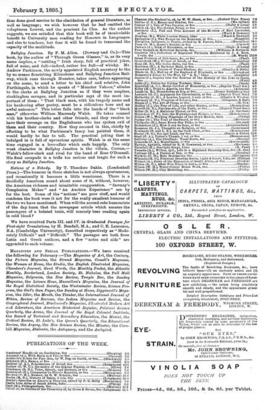Ballybeg Junction. By F. M. Allen. (Downey and Co.)—This book,
by the author of " Through Green Glasses," is, as its very name implies, a " rattling " Irish story, full of practical jokes, full of noise, and full—indeed, rather too full—of whisky. Mr. Andrew Parkinson, the newly appointed English secretary to the by no means flourishing Kilmahone and Ballybeg Junction Rail- way, which runs through Munster, takes care, before appearing on the scene, to send a letter to his chief and relative, John Farthingale, in which he speaks of " Minister Yahoos," alludes to the clerks at Ballybeg Junction as if they were soapless, stockingless savages, and in particular says of the most im- portant of them : " That black man, with his tragedy name and his hankering after poetry, must be a ridiculous bore and an awful nuisance." This letter falls into the hands of the " black man," otherwise William Macready Walsh. He takes counsel with his brother-clerks and other friends, and they resolve to have their revenge on the Englishman who has spoken evil of them and their country. How they succeed in this, chiefly by affecting to be what Parkinson's fancy has painted them, it would hardly be fair to tell. The practical joking that is indulged in is fall of uproarious spirits. Walsh is at the same time engaged in a love-affair which ends happily. The only weak character in Ballybeg Junction is the villain, Curran,— Walsh's fellow-clerk and rival for the hand of Rose O'Donnell. His final escapade is a trifle too serious and tragic for such a story as Ballybeg Junction.


































 Previous page
Previous page